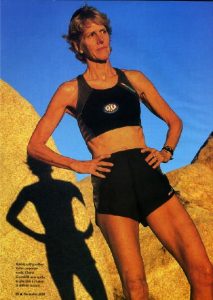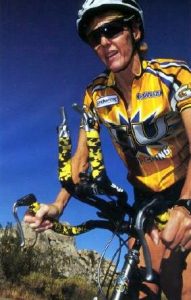

Cherie Gruenfeld found success and happiness after walking away from a stellar career in corporate America. Today, after nine consecutive finishes, four wins and a 55-59 age group course record all in Hawaii, Gruenfeld’s giving back with an inner-city tri program for kids.
It was a Sunday morning in 1986 and Cherie Gruenfeld was sitting in bed with husband Lee, drinking coffee and eating sticky buns. For the two busily traveling corporate captains, it was a small and deliberate miracle that they were in the same bed. The weekend rendezvous is all they typically had to share and at times, any neutral city would do. But on this particular day in March—the day of the first L.A. Marathon—they happened to be in their very own bed in Santa Monica, Calif. Coffee, companionship and sticky buns. Life, if for only this very moment, couldn’t have been better.
Thumbing through the paper, Gruenfeld read about the marathon. She was in her early 40s and, aside from tennis and skiing, she wasn’t highly active. Today, she remembers asking her husband if the event would be cancelled; it had rained the day before and the roads would be wet. “But I turned on the TV,” says Gruenfeld, “and there it was. I watched it wire to wire, fascinated by the whole thing.” The next day, she bought a pair of running shoes and a book for first-time marathoners. Her first run was 10 minutes. Five months later, well ahead of her one-year goal to run the next L.A. Marathon, Gruenfeld ran the Humboldt Redwoods Marathon in northern California in 3:26, qualified for and went on to run Boston in 3:23. Now its 15 years later and the evolution continues. On October 6, Gruenfeld, 57, will compete in the Hawaii Ironman with nine consecutive finishes, four wins, the 55 to 59 age group record of 11:58:29, set in 1999, and the official WTC distinction, women’s 2000 Age Grouper of the Year.

Reluctant Warrior
Gruenfeld’s introduction to triathlon was slow, almost reluctant. A widely known software marketing whiz, she traveled extensively but could always find room in her suitcase and schedule for a pair of running shoes. She had been running a couple of marathons a year—eventually posting a PR of 3:07 at the Twin Cities Marathon—when she was injured and looked toward biking, swimming and eventually the sport that combines it all with running. But after racing her first triathlon in 1990, the San Diego International, she was indifferent and still focused on pure running. “I thought it was fun,” she says of her first triathlon, “but it really didn’t capture my attention.”

In October of ’91, she read an article in California’s Competitor magazine about the Ironman. The concept passed right through her and didn’t stick, and the magazine sat on the coffee table. Until her husband picked it up.
“The Ironman,” Lee remembers, “had always seemed to us an exotic, distant and somewhat unfathomable thing, undertaken only by psychopaths whose terrestrial origins were suspicious.” But something about that article changed his mind. His wife, he thought, could do this, and she could likely do it well.
At about the same time, both were tiring of their fast-paced careers. Enough was enough. “One night we met at an airport VIP club when I was heading out to Minnesota and she was flying back from Boston,” recalls Lee. “The absurdity of it hit us both, and we decided to do something about it.” Lee decided to resign his partnership at the prestigious management consulting firm Deloitte & Touche to take a crack at writing a book, and Gruenfeld, then vice president at the Artificial Intelligence Corporation, began considering whether a leave would allow her to do the Ironman. Six months of dedicated training, she had often told Lee, would do it. When Lee’s writing paid off big with a $1.2 million book deal, he issued the challenge. Gruenfeld didn’t hesitate, immediately resigned her position with AICorp, and presented her Kona objective to San Diego coach Ron Smith.
“How are you gonna get there?” Smith asked.
“Uh, on a plane,” Gruenfeld replied, unaware of the qualification process.
The two aimed for her to qualify with Ironman Canada, but Gruenfeld surprised herself by earning a Hawaii slot at Mike and Rob’s Triathlon, an event they had scheduled as a training race. True to the familiar tale, her Ironman in ’92 was to be a one-time event.
Aside from her nine Hawaii starts and finishes, Gruenfeld has done both Germany and New Zealand, and Ironman USA in Lake Placid, the latter event twice and once in 2001 with a record time of 12:08:10. She raced Germany in ’96, going 11:17 to successfully surmount her seemingly perennial 12-hour nemesis in Kona, a barrier she ultimately broke as well with her record-setting finish in ’99. The title in Hawaii was hers again in ’00, adding to her wins from ’94 and ’95. Gruenfeld has only DNF’d once, at a race in Bakersfield in ’94 when the handlebars fell off her bike. In the last two years, she’s won her age group in every race she’s ever started—sprint, Olympic, half, full.
But for Gruenfeld, Ironman is the game and every other event mere practice. And it’s a game she knows well. Her training is strict, but smart and specified, and her lifestyle pleasantly accommodating: She and Lee now split their time between two homes, one in the mountains and one in the desert, both near Palm Springs, Calif. Weeks are organized to include key workouts with plenty of rest in between and she doesn’t stray far from the plan: a long run, a long bike, a brick and regular time at the pool in the desert or the lake in the mountains. There are no junk miles, and there is also no time on the track—only an occasional fartlek run. Off-seasons are treated with active rest and cross training, including an occasional snowshoe race.

Giving Back
Before her career in industry, Gruenfeld spent nine years as a teacher, covering everything from elementary school to college-level computer science. A skilled public speaker, she motivated people in business, and now with her experience in Ironman, she motivates people in life. In all, she’s a natural leader: Set an example, and show others how to follow.
“She has inspired and cajoled dozens of people to enter the sport of triathlon,” her husband says. “Mostly bikers and runners, and most of them have stayed with it under her tutelage. She’s also taken a bunch of people from dead zero to Ironman, and thus far not one of her trainees has ever failed to finish. A few have qualified and gone on to do Kona.” Recently, Gruenfeld was honored as a Woman of the Year by Soroptomist International for her work with women athletes.
“She sees people as being bigger than they see themselves,” says Jacque Irons, a teacher at Cypress Elementary School near San Bernardino, Calif., where Gruenfeld was invited to speak last fall. “No matter where anyone is, she takes them from exactly where they’re at and moves them on.”
As part of her school program Exceeding Expectations, Irons invites motivational speakers to Cypress. After hearing of Gruenfeld through a friend who is a cyclist, Irons invited her to her school.
“After showing a video,” recalls Lee of an earlier such engagement, “she took them through an entire simulated Ironman. For the swim she had them all put on goggles, then crowd together and jostle each other while gargling salt water. Then they hopped onto a stationary bike, ate Powerbars and pedaled furiously while she blasted them with a big fan and hair dryers. They jogged in place for the run and drank Gatorade as she broke out light sticks and pinned them to their shirts, then she had them throw their hands up as they crossed the finished line.”
Encouraged by an enthusiastic reception at Cypress, Gruenfeld asked Irons about the possibility of getting the kids in a race. “These are kids from a really low socioeconomic environment,” says Gruenfeld, “kids that have never had opportunity presented to them before, so everything’s a gift to them.” So many expressed an interest that Irons was forced to hold tryouts. One 5k running race and two relay triathlons later, 15 Cypress kids now have a new outlook on life—much like Gruenfeld herself did after leaving corporate America.
Eleven-year old Emilio Holguin shows particular promise and is aiming for Kona one day. According to Irons, his promise and potential have transformed not just his family, but the entire community. “I love the community and I have been waiting and waiting for an opportunity like this to come along,” says Irons.
“I’m very hopeful that we can maintain it,” adds Gruenfeld, “so that these kids continue to have this opportunity in the future.”

Anyone wanting to donate used triathlon equipment can send donations to the kids at Cypress Elementary School. The group has a particular need for road bicycles that can fit 11- and 12-year olds, and cash donations are also gratefully accepted.
Cypress Elementary School
Exceeding Expectations Athletic Program
Care of: Ms. Jacque Irons
26825 Cypress Street
Highland, CA 92346